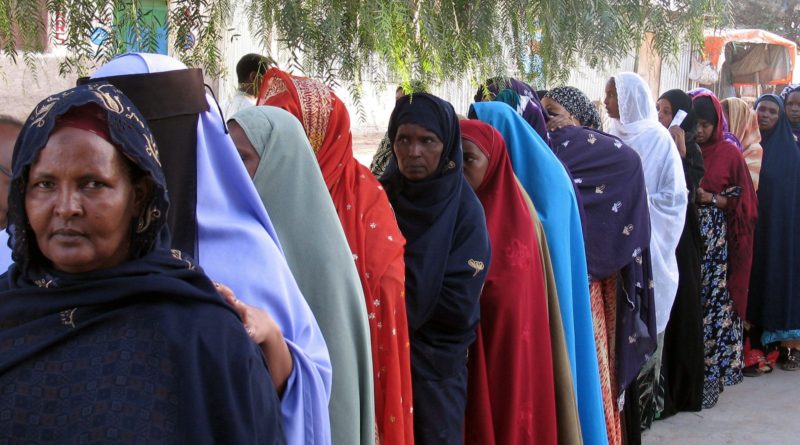Somaliland hopes election will bolster case for independence
When Somaliland elects its new president on Monday voters will be engaging in a rare event for east Africa: a ballot that is expected to be free, fair and credible.
The incumbent is stepping down. Voter registration has been conducted, for the first time anywhere in the world, using iris-recognition technology. Campaigning has been largely peaceful. All three candidates have complimented the electoral commission. And no one knows who is going to win.
“The election has been managed very transparently and accountably,” says Mohamed Farah, the director of the Academy for Peace and Development, a research institute in the capital Hargeisa. “We don’t see any potential conflict over the result.”
But despite the fierce competition, most of the 4m Somalilanders are united in eyeing a bigger goal from the vote. They hope a third smooth presidential election in 14 years will help win international recognition of their 1991 declaration of independence from Somalia.
While there is widespread de facto acceptance of the former British colony’s separate status — a high-level delegation from western countries will be in Somaliland for the vote — no government has formally acknowledged the territory’s independence. “Many governments have said ‘we’ll be second to recognise you’,” said Sharmarke Jama, a former government trade adviser. “The challenge is convincing someone to be first.”
After years of fruitless talks with Mogadishu on full independence, recent events are giving secessionists cause for optimism.
Earlier this year the United Arab Emirates agreed to invest $440m to modernise the port of Berbera, the first deal of such size with a foreign government. Dubai is also building a military base in Somaliland and is spending some $200m more to develop Somaliland’s so-called Berbera corridor, which connects the port to the Ethiopian border.
Ethiopia is also engaging. It has taken a 19 per cent stake in the Berbera port as it seeks to diversify its dependence on Djibouti for its exports. Hailemariam Desalegne, the Ethiopian prime minister, has met all three candidates running for the Somaliland presidency.
“We are at a turning point,” said Ali Ali, a spokesman for Muse Bihi Abdi, the ruling Kulmiye party candidate. “We expect the election to be a launch pad for a new era.”
Mr Abdi’s main challenger is Abdirahman Abdullahi, speaker of parliament for 12 years until three months ago and head of the Waddani party, which is less enthusiastic about the UAE deals.
Michael Walls, a Somaliland expert at University College London, and head of an unofficial international observer mission for the election, says the territory is in a “pretty remarkable position”.
After ending ties with Britain in 1960, Somaliland was part of Somalia until that country’s government collapsed in 1991. It declared independence that year as Somalia descended into civil war, held a constitutional referendum a decade later, and conducted its first presidential election in 2003. The result was accepted despite the margin of victory being only 80 votes.
The territory has been largely peaceful ever since, in contrast with its neighbours Djibouti, Eritrea, Sudan, South Sudan, Ethiopia, Somalia and Kenya — which are all, to varying degrees, either authoritarian or mired in political turmoil.
There’s an acceptance that Somaliland is a functioning polity that shouldn’t be disrupted Michael Walls, a Somaliland expert at University College London Mr Walls accepts that Somaliland is “not a shining example of all things good”. Indeed, this presidential election was originally scheduled for two years ago; the last parliamentary election was in 2005; there are accusations of corruption over the UAE deals; and freedom of expression is limited.
But he adds: “There’s an acceptance that Somaliland is a functioning polity that shouldn’t be disrupted.”
the economy is also extremely fragile. A year ago outgoing president Ahmed Mohamoud “Silanyo” said per capita gross domestic product was around $400. But since then some 75 per cent of the territory’s livestock herd — the main export — has been killed in a drought. Oil exploration is being discussed but that is expected to be years away.
The biggest impediment to independence is persuading the federal government of Somalia to agree to a plebiscite on the issue. Abdirahman Omar Osman Yarisow, the Somali information minister, says Mogadishu is “not opposed to a referendum” but adds several caveats.
“This can come after we discuss it and if we can convince Somalis that it’s the best option,” he says. “The government in Somaliland also needs to do more in terms of freedom of expression and freedom of the media so there can be a genuine debate over whether it’s better to have unity or separation. At the moment they’re indoctrinating their people rather than allowing them to decide their destiny.”
Also casting a shadow is the collapse of the most recent African territory to be granted independence. Six years after breaking away from Sudan, South Sudan is mired in a civil war that has killed tens of thousands of people and displaced almost half the population.
Several other African governments, such as Cameroon, are wary about the example Somaliland independence might set as they contend with separatist movements.
Somalilanders insist their circumstances are different. “I think everybody should recognise the reality on the ground,” says Mr Ali. “We have peace, we have stability.”
This article was originally published on Financial Times

